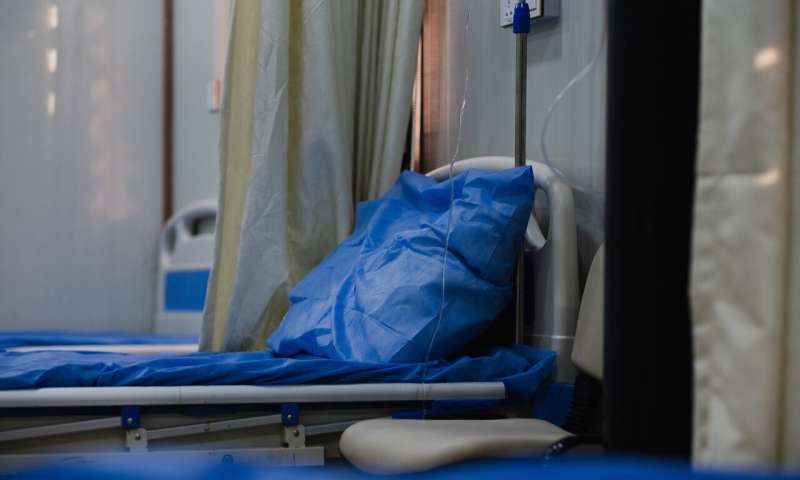Credit: Unsplash/CC0 Public Domain
Most adults with systemic lupus erythematosus (SLE) are not at increased risk of hospitalization from COVID-19 due to medications used to dampen their altered immune system, the cause of their disease. Nor are most people with more common types of arthritis, such as rheumatoid, psoriatic and spondyloarthritis, at greater risk of hospitalization from COVID-19, a pair of new reports shows.
SLE, known widely as lupus, along with common forms of arthritis, are autoimmune conditions caused by the immune system's mistaken attack on a person's own tissues, leading to inflammation in the joints, skin, kidneys, and other parts of the body. The majority of those affected by these diseases are women.
Although the new studies, led by NYU Grossman School of Medicine researchers, show that for some of those affected the use of steroid medications to reduce inflammation slightly increased the likelihood of needing hospital care, researchers say the results should be reassuring to patients overall.
Many people are taking steroids or other immunosuppressing medications, especially newer biologic drugs, to prevent their immune system's attack on their tissues. And the researchers say their patients report feeling added anxiety that their treatments make them more susceptible to the dangers of coronavirus infection.
In the first study, published recently in the journal Arthritis and Rheumatology, researchers closely monitored the health of 226 adult patients, mostly Black, Hispanic, and female, undergoing treatment at NYU Langone Health clinics or NYC Health + Hospitals Bellevue Hospital for mild to severe forms of lupus. All were surveyed by phone or email, or had their medical records checked between April 13 and June 1, when the pandemic peaked in the New York City region. Twenty-four were hospitalized out of 41 who were formally diagnosed with COVID-19, and four of them died. Another 42 had COVID-19-like symptoms but were not formally tested.
For the second study, published in the same journal, researchers monitored 103 mostly white women being treated at NYU Langone Health clinics between March 3 and May 4 for inflammatory arthritis, which unlike common osteoarthritis, does not primarily result from joint wear and tear. All tested positive for COVID-19 or had symptoms highly suggesting they were infected. Twenty-seven (26 percent) were hospitalized, with four deaths (4 percent).
Researchers say their latest study findings showed that lupus patients taking immune-suppressing medications, such as mycophenolate mofetil (Cellcept) and azathioprine (Imuran), had no greater risk of hospitalization (15 out of 24) than lupus patients not using the medications (nine of 17). Similarly, hospitalization rates for people with inflammatory arthritis (26 percent) and COVID-19 were also no greater than seen for all New Yorkers (25 percent, according to city figures).
Among the research team's other findings was that patients taking biologic drugs for arthritis, such as adalimubab (Humira) and etanercept (Enbrel), which are made from living cells, or the antiviral hydroxychloroquine, were at no greater or lesser risk of hospitalization than those not taking the drugs. However, those taking glucocorticoids, a type of steroid, even in mild doses, were upwards of 10 times more likely to be hospitalized than arthritis patients not using steroids. The researchers caution that although statistically significant, the study's small size may overestimate the actual risk.
"Our findings represent the largest of its kind for American patients with lupus or arthritis and COVID-19, and should reassure most patients, especially those on immunosuppressant therapy, that they are at no greater risk of having to be admitted to hospital from COVID-19 than other lupus or arthritis patients," says one of the studies' co-lead investigators, Ruth Fernandez-Ruiz, MD.
"People with lupus or inflammatory arthritis have the same risk factors for getting seriously ill from COVID-19 as people without these disorders," says Fernandez-Ruiz, a postdoctoral fellow in rheumatology in the Department of Medicine at NYU Langone.
These shared risk factors, she says, which overall more than double people's risk of hospitalization from COVID-19, are having multiple underlying health conditions, such as obesity, hypertension, and diabetes.
"Patients receiving therapy for lupus and inflammatory arthritis should not automatically stop taking their medications for fear that they would be worse off if they also caught the coronavirus," says another of the studies' co-lead investigators, Rebecca Haberman, MD. "Instead, rheumatology patients should consult with their medical provider about their overall risk factors for COVID-19 and make plans accordingly," says Haberman, a clinical instructor in rheumatology in the Department of Medicine at NYU Langone.
More information: Rebecca H. Haberman et al, COVID‐19 in Patients with Inflammatory Arthritis: A Prospective Study on the Effects of Comorbidities and DMARDs on Clinical Outcomes, Arthritis & Rheumatology (2020). DOI: 10.1002/art.41456
Provided by NYU Langone Health
























